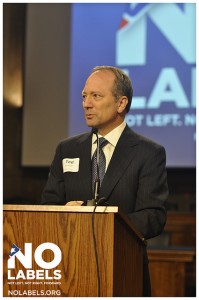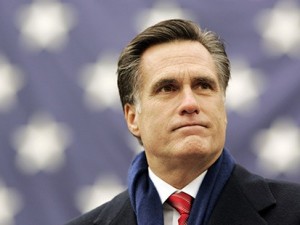By RP Nation, on Wed Nov 28, 2012 at 9:15 AM ET As the new Steven Spielberg movie has reignited our national passion for our 16th President, The Recovering Politician today begins featuring a series of posts from one of the nation’s leading experts on the topic: Dr. Matthew Pinsker, a Lincoln scholar, Civil War historian and college professor based at Dickinson College in Carlisle, PA (and of course, longtime Friend of RP). For the last five years, Pinsker has personally trained more than 2,500 K-12 educators on Civil War and American history topics, and he has also been directing the House Divided Project, a digital effort designed to help classroom teachers use the latest technologies to promote deeper study of the American Civil War during its 150th anniversary.
Here is his first column, cross-posted with Quora.com, with permission of the author:
It’s a mistake to worry about whether “Lincoln” the movie is historically accurate.
It’s historically inspired and inspiring but by definition any work of art that blends fiction (such as invented dialogue) with fact should never be considered “accurate.”
Spielberg himself acknowledges all this when he describes his movie as a “dream” and as a work of “historical fiction” (see his Dedication Day speech, November 19, 2012 at Gettysburg for a good example).
That doesn’t mean that the movie has no use in the history classroom or for the lifelong history student. “Lincoln” the movie creates an unforgettable historical mood or experience that almost no actual history of the period can match. It truly feels like “writing history with lightning” (Woodrow Wilson on another powerful movie, “Birth of a Nation”).
But accurate history sticks to the evidence and Spielberg and scriptwriter Tony Kushner don’t. When they want to convey the complicated dynamic of the Lincoln household, they take that responsibility seriously and consult several leading historical studies to create a layered account but at the end of the day they simply invent the most compelling scenes such as a bitter bedroom argument between First Husband and wife or a stunning scene where Abraham Lincoln slaps his oldest son (which, by the way, would NEVER have happened).
They also condense, conflate and simplify the politics behind the passage of the Thirteenth Amendment, which is the focal point of the movie. Just compare the Spielberg/Kushner interpretation to the best academic account of the subject (“Final Freedom” (2001) by Michael Vorenberg) and you realize how many corners the movie has to cut and nuances it has to ignore.
 Professor Matthew Pinsker Watching the movie, for example, it’s easy to forget that Lincoln was pushing for approval from a lame duck Congress where his numbers were worse than they would be in the newly elected Congress.
Why would he do that?
The movie also struggles to portray the details of the lobbying effort (relying heavily on invention, imagination and more than a little corny comic relief). Yet this movie probably does better on this difficult subject than any other American film.
So, accurate? No. But excellent anyway? Absolutely. In other words, don’t go to this movie (or any historical movie) to learn the facts. Go to imagine the experience and to enjoy the illusion that a great filmmaker can create.
By RP Nation, on Thu Nov 22, 2012 at 8:45 AM ET Jennifer Laszlo Mizrahi, a Friend of RP, and the Founder (and for many years, the President) of the highly influential The Israel Project wrote an op-ed in today’s The Times of Israel in response to The RP’s widely read column this week in The Huffington Post: “Why My Fellow Liberals Should Support Israel in Her Conflict with Hamas.” We cross-post it below with the author’s permission:
Jonathan Miller’s op-ed supporting Israel in its conflict with Hamas in the liberal Huffington Post was right on the mark. In it he does an outstanding job in the vital role of defending Israel’s moral obligation to protect its citizens from Iran-backed Hamas. However, he also says that American liberals should stand with Israel because of Israel’s “feminist approach to the empowerment of women.”
While it is true that Israel is a bastion of feminism compared with other nations in the Mideast, the Israel of today has a long ways to go on women’s rights.Israel’s female Prime Minister, Golda Meir, served a long time ago. Sadly, the Israel of today is experiencing a gender-fairness crisis that endangers both its progress and security.
 Jennifer Laszlo Mizrahi When Israeli Prime Minister Netanyahu pulls together his inner-cabinet to make critical decisions, he calls together a group of nine men, no women. The full cabinet is 30 men, two women. I don’t know of any women on the prime minister’s senior staff, or in Israel’s senior ambassadorial posts at this moment in time. Indeed, when U.S. Secretary of State Hillary Rodham Clinton arrived in Israel for meetings, did any women meet with her who did more than pour her coffee?
The majority of Israelis are women. Yet where are they in Israeli public life?
Elections will be held in Israel on Jan 22nd. Unless something dramatic changes, it is unlikely those gender numbers will change much in Israel’s leadership, if at all.
I am grateful that Israel exists. I am praying that the ceasefire may last so that innocent lives can be saved on both sides. I have dozens of friends in Israel who I consider family. When their children are called up to the reserves, or they run to their “safe rooms,” or a bus blows up, I feel as if a member of my immediate family is on the front lines as well.
Read the rest of…
Jennifer Laszlo Mizrahi: Women’s Rights in Israel are a Core Security Interest
By RP Nation, on Wed Nov 14, 2012 at 1:30 PM ET  Once upon a time, after the campaign rallies were over, the ballots counted, the concession calls made, and the victory speeches given, the American campaign season ended. Politics remained a sport for those who chose to engage, but most of us happily moved on. Some actually took to the business of governing. Today, a multibillion-dollar election industry swings into motion before the confetti is swept away. It is an industry that thrives on year-round conflict. And the Jewish community is anything but immune from its reach. Once upon a time, after the campaign rallies were over, the ballots counted, the concession calls made, and the victory speeches given, the American campaign season ended. Politics remained a sport for those who chose to engage, but most of us happily moved on. Some actually took to the business of governing. Today, a multibillion-dollar election industry swings into motion before the confetti is swept away. It is an industry that thrives on year-round conflict. And the Jewish community is anything but immune from its reach.
To see the evidence of this transformation, one has only to look at the surprising number of start-up Jewish organizations — advocacy groups, media outlets, and legal operations — that enter the communal arena with their politics on their sleeves. They come from the left and right and are joined by networks of activists. At face value, there is nothing wrong with this political activity. We enjoy a rich pluralistic tradition of argumentation and debate within the Jewish community. But while we thrive on this vocal pursuit, we are now witnessing the emergence of a new partisanship. It is bolstered by the belief, sometimes grounded in reality, but often clouded by fantasy, that every decision made, every speaker heard, every word of every resolution will have a profound impact on world events. And so large issues are acted out on small stages. Again, there is nothing wrong with this activity — until the hubris of a grand impact takes hold. Then, compromise slips out the door. As with political campaigns, there can only be winners and losers in this enterprise. The prize is never to be shared. Robust debate morphs into blood sport.
 What we lose as a result is enormous. Our capacity to debate, share, listen, and compromise is diminished; eventually, even our sense of klal Yisrael wanes. Rather than engaging in discourse that provokes new ways of thinking — and that may even change minds — we find ourselves in camps, with large blocks of Jewish voices that cannot comprehend how there could possibly be Jews who see important issues in a different way. Voices on either side, buoyed by confirming networks, isolated from earnest conversation across conflicts, enter the debate seeking a winner-take-all result. In the end, we all lose. To the outside world, it is just noise. What we lose as a result is enormous. Our capacity to debate, share, listen, and compromise is diminished; eventually, even our sense of klal Yisrael wanes. Rather than engaging in discourse that provokes new ways of thinking — and that may even change minds — we find ourselves in camps, with large blocks of Jewish voices that cannot comprehend how there could possibly be Jews who see important issues in a different way. Voices on either side, buoyed by confirming networks, isolated from earnest conversation across conflicts, enter the debate seeking a winner-take-all result. In the end, we all lose. To the outside world, it is just noise.
Read the rest of…
Ethan Felson: The Politics of Compromise
By RP Nation, on Fri Nov 9, 2012 at 9:15 AM ET Bradford Cummings — a former chairman of Louisville’s Republican Party, a leader in the Kentucky equine industry, and (I understand) the owner of a quite beautiful singing voice — published a very brave and poignant op-ed in today’s Louisville Courier-Journal that endorses marriage equality, as well as a general return to a more compassionate Grand Old Party. With his permission, we cross-post it here in whole:
It was about seven years ago that I witnessed an expression of love and devotion that has forever moved me. A dear friend had experienced complete kidney failure and needed an immediate organ donor. Without hesitation, his partner risked his own life to donate one of his two working kidneys. While I don’t see them much anymore, I know both have been given a clean bill of health. I still get choked up thinking about this story.
And yet, despite unequivocally expressing their love, these two cannot be celebrated equally with the many married couples in our society simply because they are of the same sex. The GOP must understand how important that inequality is to so many in our electorate.
Before this most recent Election Day, I believed that while gay marriage is an important issue, most people vote with their pocketbooks first. Logically, the Romney/Ryan ticket would have broad appeal, especially in this time of economic malaise. Mitt Romney, the turnaround artist, was a man uniquely created and placed here for this time in history.
And the exit polls show that most people agreed. Romney won on economic issues across the board and the American desire for smaller government was clearly communicated. But despite these advantages, the Republican nominee lost. Our country is shifting center/left on social issues. I miscalculated, and so did many others, by believing that when the ship is sinking social issues become less important.
But after some reflection, I see the error in that thinking. If the Southern Democrats of the 1860s or 1950s and 1960s, who were supportive of racist stances from segregation to slavery, were also the party of smaller government, I too would have had to vote against my economic ideals. Americans prefer limited government but not at the expense of limited social freedoms.
I also wonder exactly what we are fighting so hard to preserve. I’ve been pro-gay marriage for years but also respect that the original basis for marriage came from religious orthodoxy. Every day, I feel blessed to be married to my wife and our marriage grows stronger each year. But exactly how would that change if two men or two women held the same societal status?
The legalization of gay marriage wouldn’t force churches that disagree with homosexuality to perform marriage ceremonies or infringe on the rights of heterosexual couples. Marriage in our society has become a social contract first and should not be legally restrained through religious eyes. As a wise man once said to his followers, “Render unto Caesar what is Caesar’s.” I’m a follower of that man, but with the tax advantages and other benefits given to married couples in the United States, not allowing gay couples to participate immediately makes them a second-class citizenry.
But it’s not just the anti-gay marriage stance likely hurting Republicans in the future. While most people say they are pro-life personally, it is a simple reality the majority of Americans also want the option preserved and women especially find this to be a top priority. Personally, I find abortion as a form of birth control to be a sad and immoral act, while supporting the common exceptions of rape, incest and life of the mother. I tried to embrace a pro-choice stance in my youth, but could never get around the idea it’s ending a life. Despite this, sometimes you have to realize you are in the minority and work from within the existing realities.
Is my time better spent fighting a losing battle trying to end abortion in the United States and therefore risk losing every foreseeable national election? Or would I be better served to encourage other choices for unwanted pregnancies and not let this single issue derail the rest of my political ideology? It’s a tough one to swallow, but Republicans need to begin to ask themselves these difficult questions.
Read the rest of…
Bradford Cummings: A GOP Leader Endorses Marriage Equality
By RP Nation, on Thu Nov 8, 2012 at 3:00 PM ET The Jewish vote for Romney was 32% – up 10% from 2008..but clearly the Obama coalition doesn’t depend on it like the Democrat Party of old. It’s the new youth-single women-black-latino votes that lost this thing. I think I was somewhat prophetic in what I said to you in my email before the election.
What this means is we need to clean house and start to put other faces in charge; the future coalition of the GOP will be a synergy between social Libertarians, Jack Kemp (supply side) Republicans, and something I call Republican NeoRealists (“Neo Realism”).
This will include people like Condoleeza Rice, Allen West, Ted Cruz, Marco Rubio, Alberto Gonzalez, and Log Cabin (gay) Republicans.
NeoRealists will work for, push, support, and make law state-based solutions for replacing the social compact of the New Deal and War on Poverty, while being inclusive of the reality of our population – it is openly accepting of gay issues, and I think the Republican Party should just accept it, support it, and make it known that we’re not going to fight that issue since gays, too, are concerned about economic freedom and prosperity. I think we should just say we support gay marriage as a general rule as a state-by-state decision, and that any marriage recognized in one state will be automatically recognized in another.
To bring forward the understand of the grievances of the black population, we can there tap into the connection of the religious aspect – as churches are a core element in many around the country.
I think we’re hanging onto some ideals that are a little rediculous and there is nothing wrong with waking up to this fact.
The focus of the moral majority of the 1980s is over and we need to accept it and make appropriate changes. The Reagan coalition came together because one person had the vision to realize what unites people.
The youth today are clearly – clearly – unimpressed with the GOP. The only way to capture them is to tap into their desires. They just don’t care about anything, frankly. Look at all the smut on the internet. We can support their smut and just tax it – tax it overwhelmingly.
Read the rest of…
Jonathan Weiss: Reflections on the Election
By RP Nation, on Mon Nov 5, 2012 at 5:00 PM ET  Much talk has been centered around “voter suppression”! Much talk has been centered around “voter suppression”!
Many of you know I have been a field operative in about 40 states and often spend Election Day in some of the biggest cities in our country. I have seen these efforts up close and they fall into four categories:
1.Misinformation – mail, soundtracks, flyers and posters that tell people the wrong time date or place to vote or lying about requirements to vote
The classic example was MD where inner cities voters were told if you knew you owed taxes or had unpaid tickets you had to pay them first! Not true needless to say.
2. Slow down– challenge voters to produce ID’s or information needed to vote greater than required by law, increase the number of challenges of voters to slow down the process and increase the lines which will make people wait longer to vote and adversely effect folks who have time constrictions.
3. Direct Confrontation– verbal or physical confrontation outside of polling places yelling soundtracks folks dressed in camo or klan robes or racist tee shirts or holding posters sometimes holding weapons trying to intimidate voters not to vote. We have seen this in many ways and in many places. My worst case was in Texas in 96 runoff election; where a guy on the back of a pickup with an American Flag, shotgun and sigh that said “niggers don’t you dare vote here!” The cops would not do anything about it and took us 6 hours to get a court order to get him removed. Or a woman yelling only at black elderly voters as they walked into polls “you got your papers, you got your papers, you can’t vote if you don’t got your papers” this went on until a very old woman shakes her walker at the lady and said no but I got my granddaughter and she just got out of jail and she’s gonea kick your honky ass if you don’t shut the fuck up, her granddaughter all tatted up and with lots of gold on got out of her car and said that woman bothering you – the woman left and the grandmother started laughing turning to her granddaughter and said I know you never went to jail honey but I grew up in Georgia and no one’s stopping me from voting ever!
This type of suppression effort has some potential for violence. If so that will also slow down and disrupt the process as well as scare folks from coming out.
4. Government control of process using it in a partisan manner to tilt advantage to one side or the other. In all fairness this has been done by both sides! The number of machines at each poll the conduct of officials conducting the elections the use of sheriffs or police to enforce laws and the laws passed by the lawmakers regarding registration, AB or early vote and requirements for IDs are all examples of that. I understand from two republicans that the McMahon campaign has done suppression training last Saturday if that is true watch out New Haven,Hartford, Bpt & and other cities better have riot police ready because citizens are not going to let folks intimidate or hassle them outside polls!!
Two thoughts – it should be against the law to vote fraudulently an people who do and people who engage it efforts to conspire to aid that effort should go to jail! Their fraud is a crime against every voter. But likewise anyone who makes an organized effort to deny an citizen of our country their right to vote in any way should also go to jail. Our Government to a great extent is based on the consent of the governed. That consent is based on having a voice at the polls they view as a fair processIf the system stops voters from voting or there is violence at the polls it will be hard to put the genie of trust in the process back in the bottle and I am afraid that that some of the voter suppression efforts might lead to that, please dear God we will have a fair open election election with a very large turnout everywhere in the country and a process that make folks feel the democratic system works regardless of weather their candidates win or lose. A big fair vote makes for a strong country!
By RP Nation, on Mon Nov 5, 2012 at 10:00 AM ET  Ted Buerger, an entrepreneur who is the Chairman at American Towns, is a Co-Founder of No Labels A year ago, most pundits would have guessed that a slow economy with millions out of work, and record spending and deficits projected into the future, would favor a credible Republican challenger. Yet Gov. Mitt Romney and President Barack Obama are locked in a see-saw battle, as polls fluctuate daily at the national and state level. Why is the race so close?
Despite the Governor’s resume in business and public service, it is clear his strength is not in retail politicking, and the Democrats have smartly exploited Republican weaknesses and idiotic statements. The President’s campaign also defined Romney through negative ads in swing states, and is now running as many ads as the Republicans through election day.
To win, Gov. Romney needs to make the affirmative case that he can address the huge problems facing America. Bush II notwithstanding, the traditionally Republican ideas of spending restraint, responsible budgets and limited but effective government still play well with most voters. But after years of hyper-partisanship and Washington dysfunction, the people want government to actually work, for everybody’s benefit.
 This past summer No Labels conducted a poll and found that 54 percent of American voters want candidates who are focused on problem solving rather than on loyalty to their political parties. 84 percent want candidates who will work across the aisle to solve their problems. This past summer No Labels conducted a poll and found that 54 percent of American voters want candidates who are focused on problem solving rather than on loyalty to their political parties. 84 percent want candidates who will work across the aisle to solve their problems.
No Labels — a grassroots movement of nearly 600,000 Democrats, Republicans and independents who are dedicated to a new politics of problem solving — argues that the only way to address our country’s big problems is to work across the aisle to find practical solutions. That’s what undecided voters are looking for, and that’s what Romney needs to focus on.
In a recent ad Romney said, “We need to have leadership — leadership in Washington that will actually bring people together and get the job done and could not care less if — if it’s a Republican or a Democrat. I’ve done it before. I’ll do it again.”
As an entrepreneur, I understand the poor state of our nation’s finances and that big things get done only when people pull together — that’s why we need a leader who can work across the aisle and appeal directly to the American people. In 2008, then-candidate Obama won in part on the hope for a united “red-white-and-blue America”. In 2012, this is the roadmap to a Romney victory and to a Presidency worth having. And in 2013, the President (whoever he is) needs to embrace the No Labels philosophy. That’s the only way to begin truly fixing our big problems.
By Jonathan Miller, on Mon Nov 5, 2012 at 9:15 AM ET My fellow Americans:
Let me close this campaign for re-election with an overdue apology. Four years ago, when I first asked you for the extraordinary and humbling honor to be your President, I got a little carried away. I was so caught up in the excitement of the incredible crowds, so moved by the remarkable and quite unexpected history we were making, that I promised you a vision that was not only impractical, it was by all measures unachievable.
Sure, all politicians make promises that they can’t keep; but despite my sincere belief in the goals that I shared with you in 2008, it would have been impossible for anyone to meet them. And I apologize for setting those expectations too high.
Where I feel I let you down most was failing to achieve my vision of a post-partisan politics. Like you, I continue to be fed up with our broken government, with the hyper-partisanship that polarizes and paralyzes our system, that makes tackling our nation’s most difficult problems nearly impossible. I really believed that my presidency could transcend our mean-spirited and divisive status quo.
Unfortunately, I failed. I certainly admit that some of the fault lies in my own hands. I failed to do the little things: the intimate personal gestures mastered by Lyndon Johnson, or the brilliant employment of the bully pulpit demonstrated by Ronald Reagan.
But frankly, the larger problem was that I encountered an opposition that made bi-partisan problem-solving impossible. As early as the night of the inauguration, GOP leaders were plotting to undermine, even destroy my presidency. One was candid about it, when he admitted that “the single most important thing we want to achieve is for President Obama to be a one-term president.”
It would be unfair, however, to simply blame the Republican party for this phenomenon. While hyper-partisan obstruction by the opposition has never been worse than during this administration, it has been an enormous and growing problem over the past few decades. Indeed, our current political incentive system forces most well-meaning public servants to adhere strictly to their party line simply to stay in office. Compromise — the hallmark of our democracy — has become a dirty word.
I believe that it is time to change the incentive system. We need to fundamentally alter the way we do business in Washington so that elected officials no longer will be shouting from behind their partisan bunkers, and instead will be reaching across the aisle to work with their colleagues to solve the nation’s most difficult problems.
That’s why, if you choose to give me a second term, I will call together congressional leaders of both parties to the White House next week, and ask them to join me in changing the culture of American politics. I will bring to the table policy solutions that have been developed through diligent, bi-partisan work — proposals such as the Simpson/Bowles deficit reduction package and the Kerry-Graham-Lieberman climate change proposal — to serve as the starting point for negotiations to fix our country.
And, equally as important, I will ask them to endorse with me the ideas introduced by No Labels — a grassroots movement of more than 500,00 Democrats, Republicans and Independents — to Make Congress Work and Make the Presidency Work. These proposals mostly don’t require new laws or new spending, and they don’t favor any party or particular cause. They are simple, straightforward proposals to break gridlock, promote constructive discussion and reduce polarization in Washington.
I can’t promise that Congressional leaders will sign on. And that’s where you come in. If they refuse to accept my olive branch, if they resolve to proceed with continued obstruction and hyper-partisanship, it will be up to the American people to make them pay the price. I encourage you today, to sign on to No Labels to be prepared to apply pressure to all of your elected officials — including yours truly — to ensure that we promote problem-solving, not polarization; that we act not in the parties’ interests, but in the interests of the American people.
America truly reaches greatness when we all — elected officials and average citizens – – put aside our labels to do what’s right for the country. It is about putting our community and our country ahead of our selfish, pedestrian interests. And, in the words of the Scriptures, it is truly about loving our neighbors as ourselves.
My fellow Americans, if you give me a second term, I solemnly promise to fight my hardest to realize the post-partisan vision I painted during my first campaign. With your help — and only with your help — we can lift this country together out of the political muck, and toward common higher ground.
By RP Nation, on Fri Nov 2, 2012 at 1:30 PM ET I used to be a liberal democrat.
Obama’s record speaks for itself. Look at the numbers, not the tone of his speeches, which have no substance.
In the third debate, Obama appeared strong and spoke well. However, it was all tone. Read the transcript straight, see what they both say, their plans.
Romney has a strong plan. Obama has no plan, but he speaks with such a tone of his own grandiosity, that tone has an affect to the naive public. In truth, his whole speach, Obama just bashed Romney.
It was actually amazing to see Romney stand there and spell out his plan and then Obama talks and he first thing he says is, ” he is not going too that”. It was a very strange response.
But, then again, Obama has had a failed record with nothing to talk about for the last four years so he bashes Romney.
They say that the best defense is an offense, that is a tactic that Obama has had a lot of practice doing. Please look at the debt numbers. The food stamp numbers, the unemployed numbers, and more, from 2008 to 2012.
We were in bad shape in 2008. When Obama took office, we were 8 trillion in debt. Obama promised he would cut that in half to 4 trillion. Obama also stated that if he didn’t then he did not deserve to be re elected. The debt now stands at over 14 Trillion! Food stamps and unemployed numbers have increased by many, many millions of Americans. Check out unbiased true Facts. Check out the real numbers look at other sites, Google it. You owe it to be true to yourself and to iur Country.
By Nancy Slotnick, on Fri Nov 2, 2012 at 12:15 PM ET I am Katniss Everdeen and I approve this message. Ok, I’m not her. But I read the trilogy and I know she would be with me on this. Trust me.
Hurricane Sandy did this to my house.
And still when I heard that Mayor Bloomberg endorsed Obama because of his stance on global warming, I thought, “That’s great, maybe something good will come of this!” But I didn’t think much about global warming. Then Senator Schumer said it. And still I thought- they’re politicizing the issue. We just need some FEMA assistance right now. I couldn’t wrap my head around global warming. Maybe I was scared. It was Halloween after all. And we just lost our house.
Global warming is such a lukewarm phrase anyway – it has no bite to it. All I can think of is people who want a cause to complain about. Like Chicken Little with old “the sky is falling” thing. I love the smell of Chicken Little on my grill in the morning. Especially the grill I used to have in Fire Island. We called it circle chicken- because it was on the rotisserie- and it was so good. But I digress and I am getting sad now.
Then BAM– and it hit me. When I started pondering whether we should re-build our house at all, since our house is on a barrier island, I realized– We are destroying our planet and I’ll be lucky if NYC is around when my son grows up. This storm brought the most powerful city in the world to its knees. Way worse in devastation and vulnerability than 9-11. It’s true that because of great decisions on the part of the Mayor and others there were minimal lives lost. But when we lose whole communities, this is bigger than we realize. To anyone who’s even still considering voting for Romney after this—I hope that your roads are flooded and you can’t make it to the voting booths. I hope a fallen telephone pole blocks you from getting to the poll site.
Read the rest of…
Nancy Slotnick: What Sandy Did To My Home & My Closing Argument for Obama
|
The Recovering Politician Bookstore
|















